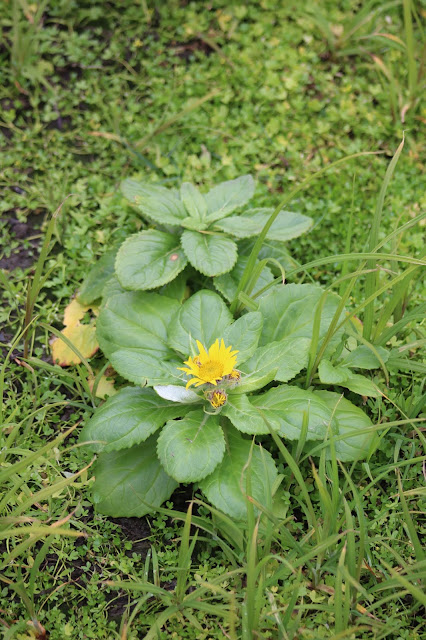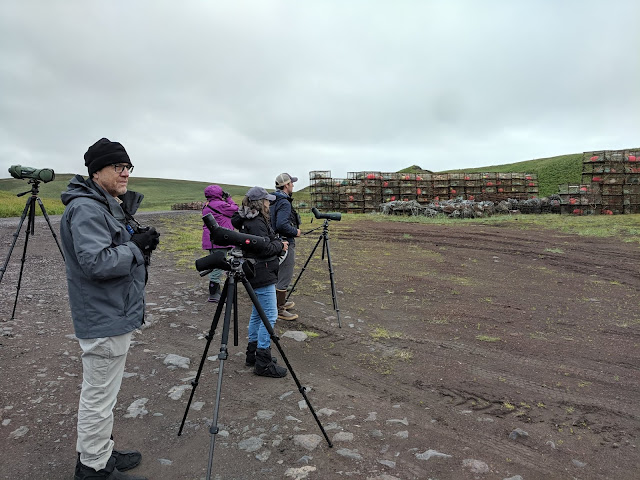I was wide awake at 4 a.m., so made myself a cup of
coffee, then went down again to eat breakfast at the Piper’s restaurant, connected to the Coast International Inn. Back in the room, I knocked out a belated
(they’re all belated at this point . . . ) Blog Post. Then, I met the other Pribilof Birders, Rick Prescott and
Lorie Leavy, Carol Archer and Rich Miller in the lobby at 10 a.m. & took
the shuttle to the airport. Our WINGS guides and half of the birders were stuck on Saint Lawrence Island due to the weather, and it will be a day or so before they can leave Gambell and catch up with us on Saint Paul. We arrived at the airport ‘way
too early, it seems, as we did not have to go through a TSA checkpoint. The five of us had a fairly long wait. My contribution to the wait was to see a
Northern Harrier fly by over the runway.
 |
| Never complain about them ensuring your plane is safe to fly in . . . . |
We finally loaded onto the RavnAir plane, only to have to
de-plane & return to the lobby, as a warning light had come on. Eventually, at about 1:15, the 15 passengers
were back on Flight 920 and in the air.
Our stewardess was Kimberly and she did a great job.
The Dash-8 made a
stop in Dillingham to re-fuel and pick up a passenger, then continued west for
another hour-and-a-half to Saint Paul Island.
 |
| I think this is Iliamna Volcano, poking through the clouds |
WINGS’ website notes that: "Alaska’s Pribilof Islands lie
some 300 miles off the North American mainland in the Bering Sea. We’ve
scheduled an extended visit to the rocky island of St. Paul to look for Asiatic
vagrants at a time when over the years many have occurred. Even without the
exciting strays for which these remote islands are famous, the sea cliffs will
still have hundreds of breeding alcids and good numbers of the near-endemic
Red-legged Kittiwake, and the Northern Fur Seal colony will be overflowing with
young seal pups."
 |
| Saint Paul harbor |
We were met by Sulli Gibson and Alex Harper, who were
guides for St. Paul Island Tours. WINGS
had arranged for them to cover for us, as the WINGS guides, and half of the
tour participants were stranded by the weather on Saint Lawrence Island, and
wouldn’t be able to make it to St. Paul for several days.
 |
| Antone Lake on St. Paul Island |
We got settled into the King Eider Motel, which is
adjacent to and part of the airport facility.
This is the old “Airport Inn”, now run by the Native TDX Corporation. The motel’s rooms are “Spartan”, with a bed,
closet, and a small drawer/bedside table, and furnished with a washcloth and
towels for the showers and bathroom at the end of a long hallway. The “common room” with the coffee maker is at
the other end. My room was smack-dab in the
middle.
When we’d eaten, at the Trident Seafoods cafeteria (where
we had all of our meals), Sulli and Alex loaded us into a van, and we went in
search of the continuing Jack Snipe.
This species is an Asian rarity to North America that had been seen
the day before yesterday. The bird
is known for holding tight to its cover, so the guides walked several transects through the marsh
in hopes of flushing it for a view, but we couldn’t raise it.
However, we did get close views of a Red Phalarope and a skulking Long-billed Dowitcher.
 |
| The British birders call this the "Grey Phalarope" |
 |
| Merriam-Webster says the name dowitcher is probably of Iroquoian origin; akin to Oneida tawístawis |
Other birds beckoned, so we drove to the
“Pribilof Forest”, which consists of stacks of crab pots. The pots provide cover on this windswept,
treeless island, and hosted a Brambling, which was a “Life Bird” for Carolyn
and Rich.
 |
| Birding The Crab Pots |
The 'resident' birds here appeared to be Rosy-finches and Redpolls.
 |
| Common Redpoll |
Then, we worked the quarry area, getting a brief view of
a Red-necked Stint before it flushed. At
the cliffs, we also had views of Red-faced Cormorants. These birds appeared to me to be about
half-way in size between a Pelagic and our west coast Brandt’s cormorants. They seem to me to be ‘stockier’ than the
Pelagic, with a thicker neck, but not so large as a Brandt’s. These weren’t terribly satisfying views of a
“Lifer” cormorant for me, but we will see them close-up later in the week at the
breeding cliffs.
 |
| I Like Flowers: This is the Arctic Poppy Papaver macounii |
It was a long day, and
after supper, we got back to the inn at dark at 9 p.m., ready to do it all
again tomorrow … and the next day … and the next …
Saint Paul Island eBird Checklist
is Here
 |
| "Seaside Ragweed" Senecio pseudoarnica |















No comments:
Post a Comment